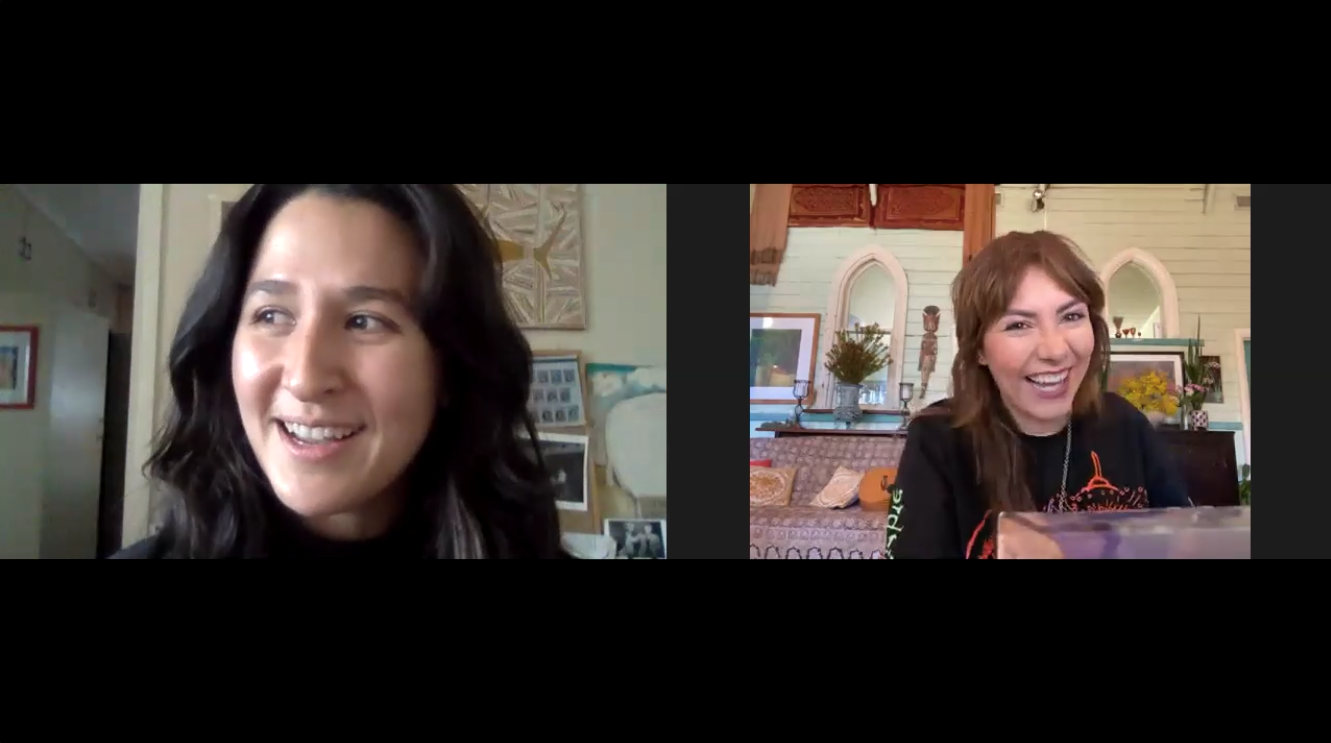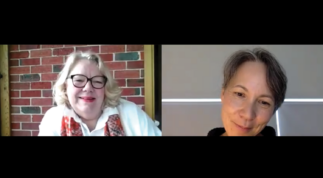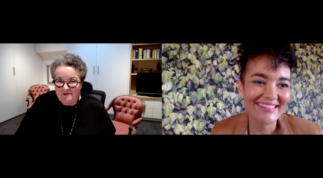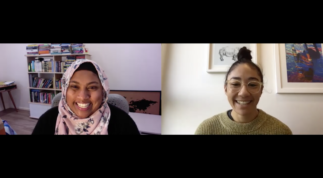The seventh edition of Feminist Fridays, presented by the Victorian Women’s Trust, was broadcast on Friday 24 July.
Featuring very talented musicians Ella Hooper and Jess Ribeiro talking about women artists and the impact of COVID-19 on the music industry.
Feminist Fridays is a live stream series featuring two feminists talking about the issues that matter. Each chat is broadcast live on the Trust Facebook page.
Catch up on their conversation now, and read the full transcript below:
Transcript:
Jess Ribeiro: Welcome. I’m speaking to you on the land of the Wurundjeri people. We respectfully pay tribute to their wisdom and custodianship of the lands and the waterways. We acknowledge elders past, present, and emerging. Always was, always will be Aboriginal land.
Jess Ribeiro: Feminist Fridays are a fortnightly series of live conversations between feminists on the issues that matter. Short, sharp, and to the point, you can watch the series live over lunch or you can catch up later. To make sure you don’t miss a thing, follow the Victorian Women’s Trust, and for those of you on Twitter, remember to use the hashtag, #FeministFridays.
My name is Jess Ribeiro. I’m a singer-songwriter, mentor and Steiner teacher. I’m here with rock icon Ella Hooper, an acclaimed musician, mentor, and radio and television presenter. We’re here today to talk about our shared experience as women working in the arts here in Victoria.
So, Ella, tell us a little bit about your career so far.
Ella Hooper: Hi, Jess. This is so nice to be chatting to you. I’m a big fan of yours. I think you’re amazing as an artist and a person and a woman in the industry. Thanks again, VWT, for having us get together like this.
Who am I? I am a singer-songwriter, first and foremost. Regional-grown and I’m back in the regions now, coming to you from Violet Town, North-east Victoria.
Jess Ribeiro: Wahoo.
Ella Hooper: Beautiful, frosty, Violet Town, which is where I grew up and where I’m now living. I’m also a mentor and an educator and I’m a one time board member of the Vic Women’s Trust, proud card carrying feminist my whole life and very passionate about feminism, where we’ve come from, where we’ve been, where it’s going. Such amazing, impactful times, and really thrilled to have been a member of that board. Had to take a leave of absence because touring was too much to do all things at all times, but that’s recently really changed, hasn’t it, Jess?
Jess Ribeiro: It sure has. Yes, it has. All plans for the year have…
Ella Hooper: Turned into dust, but can’t wait to get into it with you and talk about how this is impacting us both. I know we’ve been chatting a little bit on the internet already, you and I, just about what we’re up to and what we’re doing, but let’s open that conversation up for everybody at work or at home or wherever you’re tuning in from. Thanks for joining us.
Ella Hooper: I’d love an update from you, what you’ve been up to. You’ve got some pretty amazing noms. I don’t want to just gloss over what you’ve been up to too. We can get into the bigger questions lately but what have you been doing?
Jess Ribeiro: Besides being at home, writing music on my own, my current album, Love Hate, has been nominated for best independent rock album for the year.
Ella Hooper: Yay. That’s awesome. I want to use the little Zoom clapping emoji. I don’t know where it’s gone.
Jess Ribeiro: I don’t know how to do that yet, but it’s been great to be nominated alongside people like Nick Cave, but also so many other-
Ella Hooper: Wow.
Jess Ribeiro: female nominations. I think this year there’s more female nominations than previous years.
Ella Hooper: Yeah. And they’ve changed some of the categories around?
Jess Ribeiro: Yeah. Yeah. So, I wonder, what was it like for you starting out in the mid-’90s as a female artist compared to now? Has the industry changed for women or have women changed?
Ella Hooper: That’s such a great question. Whoa. Well, yes, it’s actually chalk and cheese. It’s been an incredible thing to witness. We have got … absolutely got farther to go. I think we’re working harder on that now than ever before. The consciousness shift has been absolutely incredible. When I entered the industry in ’96, I think women were token, at best. Girls were token at best. You got to remember I was also 13, so I was a 13 year old female.
Jess Ribeiro: When you say you were a token, I also think that you were such a huge, important part of Australian music culture.
Ella Hooper: Thank you.
Jess Ribeiro: I remember being a young person and seeing you on the television, and my whole life just exploding into possibilities that I’d never … that I’d dreamed of, but to see someone … I have this vivid memory of you being on Recovery with your brother and you were wearing this beautiful Asian cheongsam. To me, it was like … I was like, “I want to be like that girl.” It was like, “Wow, I could do that.” In such a male dominated music industry, it was the most exciting thing for me to see as a young female.
Ella Hooper: Oh, Jess. I get a hot flash when you say that because I so strongly believe in, if you can see it, you can be it. You need this evidence in the world.
Look, I don’t even know sometimes. It’s been an interesting time for me having all this time on my hands and going, in the last few years, reforming Killing Heidi. I have been looking at my origin story and looking at, how the hell did I even have the guts to just go in and do all this stuff that I now realize was so impactful? Because I certainly wasn’t thinking that at the time.
I’m honored and thrilled that it did that, but it certainly wasn’t on my mind. I just wanted to do it and I just had, I think, a lot of lucky breaks. Sometimes the stars do align and the cosmos opens up and it lets one through in a time where that’s unusual or that’s a massive privilege. I’m so aware of that now, but just hearing about the impact it has on others makes me so happy for all those struggles and all those hard times and all those times where I did feel like a fish out of water, to say the least. I knew it was important and I’m so thrilled that it’s had a flow on effect.
I’m so thrilled because I had the same feeling, looking at Shirley Manson from Garbage or looking at Courtney Love in Hole. I didn’t have any examples of that locally, but I just thought, “Why not?” I didn’t spend too long thinking about the barriers and thinking about the why nots, and just got into it. The difference is there were a few around. Of course Adalita, incredible role model for me. Magic Dirt, the first time we played with Magic Dirt I was losing my S-H-I-T because it was one of the only woman I had to look up to in the rock scene
Jess: Yes!
Ella Hooper: and it was just so exciting. Cut to now, holy cow! There is this proliferation of support and acknowledgement and sisterhood that I couldn’t access then because there was, well, only one other person doing it, and I didn’t know them, and they were a little bit older or a little bit removed or whatever. I just didn’t have the networks. I didn’t know how to make the networks or find them. Cut to now, I’m involved in so many programs that are educational or supportive of young women starting out in music and not just being lucky. Like we say, like the token, the cute chick bassist, which nothing wrong with a female bassist, I love them. I have a female bassist half the time, but that used to be the only role. D’arcy Wretzky and The Smashing Pumpkins and now it’s just … it’s an incredible time.
I could go on about how good it is at the moment. And that’s a lot of hard work from a lot of people putting their money where their mouth is. I’ve just signed on to become an ACRA mentor through a program there.
Jess Ribeiro: Wohoo, yeah I saw that.
Ella Hooper: We’re lucky that our governing body … ACRA is basically our governing body as musicians and they are putting their money where their mouth is with hooking up all sorts of mentorships. It’s just incredible. The next 20 years, the next 10 years, it’s going to be Australian female musicians take over the world. That’s what it’s going to be.
Jess Ribeiro: So that’s what it’s like. What is it like for women artists in Australia right now?
Ella Hooper: Whoa. Well, right now-
Jess Ribeiro: Right now.
Ella Hooper: I’m going to ask you the same question, Jess. I think the biggest challenge has been staying calm and positive and basically mental health and spiritual health and not panicking because our … The path that we’ve chosen is insecure, at the best of times.
Jess Ribeiro: It is.
Ella Hooper: Even when it’s going well, it’s incredibly insecure. It’s always feast or famine. I don’t know. I don’t own a house. I don’t own a car. I don’t have a partner. I don’t have any kids. I live the life of a happy gypsy and I’ve chosen that and I appreciate that. That affords me so much fun and so much pivot-ability, but then sometimes you really need to come home with almost with your tail in between your legs, which doesn’t feel so good, because you’ve chosen this weird path and suddenly you feel like an idiot because you’re a burden or whatever, or you need help from the government.
Ella Hooper: Anyway, that’s my … that’s part one for me. How about you?
Jess Ribeiro: On a superficial level, during this time in COVID, all of my festivals and shows have been canceled. I’ve lost money. I got evicted. I had to move.
Ella Hooper: Oh god.
Jess Ribeiro: I can’t play with my band consistently. That’s a huge factor in my mental health because, like you said, the path that we’ve chosen is a really insecure path to take. It’s a lifestyle that you choose and it’s not orthodox. It’s a journey and it’s not-
Ella Hooper: Do you feel like the gigs themselves are part of your mental health care? They definitely are for me.
Jess Ribeiro: Yes, absolutely. That connection between the people that you play music with, the energy that’s created when you’re coming into contact with a community and you’re being able to express yourself and share. You’re sharing your life force with other people.
Jess Ribeiro: Going back to your question of what it’s like for women artists in Australia right now, I think that it’s a really wonderful time because a lot of people have the courage to speak up and share experiences of mistreatment, past abuse or present abuse. That patriarch is falling away and I think new structures are going to have to be rebuilt.
Ella Hooper: In a much more inclusive way, that’s right. There’s finally a voice for sharing, there’s finally platforms for sharing, respecting that and then rejigging all the structures to make them inclusive and to address the imbalances which are so undeniably there. We’re so lucky we’re finally doing that. It’s a great, great time for Australia.
I just wanted to go on to practical things that maybe … I would like to not just vent because I’ve been doing a lot of venting lately. Have you found any ways to stay connected or to feel … to bring your own security in this unsecurity and to take care of yourself like that? Does the streaming thing, the Zoom thing do it for you, or does it not work the same?
Jess Ribeiro: I don’t do it very much. The times that I have done live streams have been … they have been rewarding. They have been fulfilling momentarily to be able to share and connect with people online, but I’ve found practices at home. I write every day, and that’s not to say that you’re writing a song every day. I’ll do my morning pages every day and I’ll find solace in listening to beautiful music or reading texts. Taking this as an opportunity for some soulful reflection on where we’re at at the moment in the world.
Ella Hooper: Absolutely. That leads me into the next question about music and the arts making up such a big part of how everyone is coping with this. It’s not just we musicians who have an insecure lifestyle. Maybe everyone’s getting a taste of our insecure lifestyle and finding it really freaking distressing. We’re definitely taking up our Netflix and our Stan and our entertainment and our books and our records, like never before, I think.
Ella Hooper: Somebody said to me, “This is actually a really great time to be releasing music because you’ve got a captive audience. You’ve got a lot of people at home looking for something new to stream or new to read.” We were chatting about what books we’ve been reading. I’ve also been using this as an opportunity to go internal. It’s also winter, which is a time of … we’re obviously not out there being as outgoing. It’s like all arrows seem to be pointing to go inside and do some internal work and be with yourself and see what comes up. That, in itself, is challenging.
Ella Hooper: I’ve got Joseph Campbell, as we were talking about. What are you reading?
Jess Ribeiro: Joseph Campbell. Oh, you’ve got Ben Okri as well.
Ella Hooper: Yeah.
Jess Ribeiro: Which one is that?
Ella Hooper: This is incredible. This is called, A Way of Being Free.
Jess Ribeiro: I love that guy.
Ella Hooper: He’s magical. It’s also got a contact lens stuck to it, sorry. I take my contacts out at night and they get stuck to the cover of my books. Gross.
Jess Ribeiro: I’ll take a photo of that. Hold on. Show it again.
Ella Hooper: Everybody, this is a magical book. Ben Okri, A Way of Being Free.
Jess Ribeiro: A Way of Being Free. I love that guy.
Ella Hooper: But you know, what an opportunity to go deep. I don’t know if people speak in these terms, but do shadow work and stuff like that.
Jess Ribeiro: This is like the collective shadow is coming out, isn’t it? This is an opportunity.
Ella Hooper: Exactly.
Jess Ribeiro: We’re being asked to deal with all of the shit that’s in the world. I saw this thing on the television the other day, this woman, and she said, “Whenever there’s a crisis, the inequalities in the world are revealed.”
Ella Hooper: Absolutely.
Jess Ribeiro: All of a sudden all of these issues are coming up that are always there but it’s easier for us to ignore them, and now they can’t be ignored.
Ella Hooper: Absolutely. Internally and externally. I think it’s no accident. I also had the analogy of an x-ray. COVID, the COVID crisis has been like an x-ray showing the fractures and the cracks and who is the most at risk, and we just can’t ignore that. I do think, of course, Black Lives Matter and stuff like that, but the position of women in community as well. A lot of the work that the Women’s Trust does that I think is so important, is shining a spotlight on those cracks that are ever present. A big one is finances, absolutely. Financial security and equity for women.
Ella Hooper: One thing that really got under my skin the other day was childcare workers, nurses, people in those positions and the instability they experience, those jobs are underpaid. They’ve always been underpaid. Underpaid and undervalued, and here we are suddenly going, “We need them more than anything.” They work with actual people and are actually … The most vulnerable times of your life when you were a tiny child or when you’re an elderly, possibly infirmed, person. There are other women and there they are getting underpaid and there they are now …
Ella Hooper: Anyway, I just think it’s an incredible spotlight to shine and we need to push at this time.
Jess Ribeiro: It’s the falling away of the patriarchy, isn’t it? It’s like the coming forth and prioritizing really what matters.
Ella Hooper: Exactly.
Jess Ribeiro: Taking care of young children matters. We need to be supporting these teachers and these people that are caring for the sick. And then you have music and you have the arts and these are healing tools. If we’re lucky enough to be safe at home or even if you’re not safe at home, there might be a moment in your day where you are fulfilled internally and you’re nourished by listening to a song or reading a book or a piece of poetry. That-
Ella Hooper: Medicine.
Jess Ribeiro: … inner hunger. Yeah, that medicine.
Ella Hooper: That was something I will never, ever forget about to go on stage at Queenscliff Music Festival, I think it was. Jimmy Little, when he was still here, he was about … well, we were about to go on stage with my band at the time, The Verses, and he patted me on the back, he goes, “Go give them the medicine, kid. Go give them the medicine.” And I was just about to go on stage and almost started crying because Jimmy Little is saying this incredible thing that I’ve never forgotten. I think the arts is definitely medicine for everyone.
Ella Hooper: I know we don’t have so long to chat today but I thought some … another thing to acknowledge was the response of things like, again, with women in the industry. Isol-Aid being one of the best things to come out, quick response-
Jess Ribeiro: Oh goodness.
Ella Hooper: … and run by women, of course. A concept of women, the brainchild of an amazing team of women, and has just been a wonderful thing connecting us musos and giving us a chance to … On that, I just … income streams and ways to support musos like Jess and like myself, do you have merch for sale? Are you thinking up ways to make money that’s not touring-based, Jess? What can people do to support you?
Jess Ribeiro: That’s a really good question. Merch sales, buying records. Maybe now is a good time to buy somebody’s album.
Ella Hooper: It is the right time. It’s the perfect time.
Jess Ribeiro: It’s always the right time, but if you’re able to, then this is the time to do it. Absolutely.
Ella Hooper: It is. I’ve got a lot of trips to the post office happening because I’m ordering this and that and ordering a t-shirt from, say, my friend in Sydney who can’t tour. I’m ordering a record from my friend in the States who was going to have a big launch and now they can’t.
Ella Hooper: I’m not trying to grumble here, but we’ve isolated things like that and we’re all asked to donate. Do remember to donate. If you’re watching someone online and you’re watching something streaming and it has the option, it’s often optional so you don’t have to give any money to watch the show. I did another one called, Delivered Live, the other day-
Jess Ribeiro: Good.
Ella Hooper: … and it’s optional. If people don’t fork out a little bit for these performances, it does run the risk of lowering our value. Even lower, financially speaking, than where it was before COVID, which is not helpful. If you’re going to support an artist, really buck in with what you would normally pay. I ask people if you can do that, to do that. I understand it depends on who you’re talking to because some people just can’t do that, but some people can.
Jess Ribeiro: That’s right.
Ella Hooper: But we need you to. We need you to do that.
Jess Ribeiro: We do need you to do that.
Jess Ribeiro: Great. It’s been so nice talking to you today, Ella.
Ella Hooper: Love it. I wish we had longer.
Jess Ribeiro: I know. I want to talk about all of this music medicine. There’s so much. And the shadow, all of this work we can be doing on ourselves while we’re at home. It’s really hard to sit with yourself a lot of the time, but maybe this is an opportunity for us to reimagine what the new world looks like.
Ella Hooper: That’s the intention I would love to spend my time in. In and around that intention of coming out better and having the world come out better. If we can all focus on that and make micro changes or big changes in that direction, then this could be the absolute silver lining.
Ella Hooper: I do think there is always a silver lining. That’s me, I’m a chronic optimist.
Jess Ribeiro: Me too.
Ella Hooper: We need to push in that direction. I think maybe we need a whole podcast just about shadow work and about …
Jess Ribeiro: We can do it. I had this thought the other day, I thought, “Surely there’s all of these young people out there who are secretly chipping away at home and they’re going to emerge and blossom.”
Ella Hooper: Absolutely.
Jess Ribeiro: And we don’t even know who they are yet, but they’re at home and they don’t have jobs because they’ve just finished uni or they’re about to finish school. There’s been so much I feel like it’s negative pressure on them, like, “You’re going to have to carry a tax debt,” or, “What are you going to do if you can’t get a job?” And it’s like, “Well, maybe, maybe not. Maybe you can …”
Ella Hooper: Be the new waves. The new wave of the new age.
Jess Ribeiro: Yes. I love it.
Ella Hooper: Beautiful. It’s been so, so nice to talk to you, too. I think I’m just going to wrap it up and thank Feminist Fridays, everybody. You can also catch up on all the episodes so far on Facebook or on the VWT website, which you should be perusing anyway because it has, just, so much good stuff on it. Vic Women’s Trust is just such an incredible resource for us all, especially at times like this.
Ella Hooper: Feminist Fridays are brought to you by the Victorians Women’s Trust. If you’d like to support their work towards gender equality, you can make a donation.
Ella Hooper: What was I just saying? Important time to donate to things you care about via vwt.org.au/donate. Go for it, do that and buy some of their merch too. Their tea towels are incredible.
Jess Ribeiro: The tea towels are so good. Tea towels.
Ella Hooper: How good are the tea towels?
Jess Ribeiro: Oh my god, I love them. My friend turned some of the tea towels into pillows.
Ella Hooper: That’s a good idea. I was going to frame them. Pillows is better.
Ella Hooper: VWT are going to be pausing this series for a short while, but don’t worry, they will be back. There’s more online events and talks on the horizon coming up next week. On Tuesday the 20 … 28th of July, VWT will be hosting a free panel talk truth, power, and what will it take to end sexual harassment? Very, very pertinent.
Jess Ribeiro: Oh my god.
Ella Hooper: That event is filling up. I know. We got to tune in for all of this and that’s filling up, so make sure to register because then you can definitely be a part of it.
Ella Hooper: Lastly, to be the first to know about all of their future events, just sign up to the VWT mailing list. That’s what you want to do because it’s just … it is, like I say, it’s a constant smorgasbord of feminist delights and brain food and heart food and soul food, so get on that mailing list.
Jess Ribeiro: Thank you, Ella.
Ella Hooper: Thanks Jess. It’s so nice to see your beautiful face, and thank you, everyone, for tuning in. There’s so much more to say but hang in there everybody and support each other.
Jess Ribeiro: That’s the spirit.




